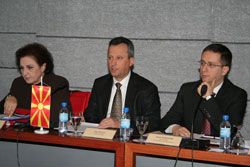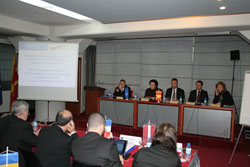Monday, 8 February 2010
Address by the President of the Assembly of the Republic of Macedonia, Mr. Trajko Veljanoski at the International Workshop “Conflict of Interests and Property Situation”, organised by the Sate Commission for Prevention of Corruption

Ladies and Gentlemen,
Your Excellencies,
Dear Friends
"Concerned about the seriousness of problems and threats posed by corruption to the stability and security of societies, undermining the institutions and values of democracy, ethical values and justice and jeopardizing sustainable development and the rule of law”,
I believe that many of you recognise that this is an extract from the Preamble of the United Nations Convention against Corruption, which the Republic of Macedonia signed in 2005 and ratified in 2007. I pointed out this Convention starting from the fact that corruption is not a local problem any more, but a transnational phenomenon which concerns every society and every economy. At the same time, we are witnessing the connection between corruption and other forms of crime, especially organised and economic crime. That is why in order to organize successful prevention and fight against corruption is necessary we need international cooperation.
The workshop on “Conflict of Interests and Property Situation” is in this direction, and I am convinced that the participants will exchange their experiences in the field of fight against corruption. We need continuous cooperation with the aim of exchanging the positive experiences and results, cooperation through which we will learn, obtain knowledge, but also transfer to the others our accomplishments and results.
Ladies and Gentlemen,
If corruption today is an international phenomenon, the fight against it starts at home - in our own backyard. I will remind you that the Republic of Macedonia adopted the Law on Prevention of Corruption in 2002. This Law has been amended several times; the latest changes were made in 2008. In my opinion these amendments were made in order to improve the prevention and fight against corruption in these new conditions.
In 2007 the Law on Conflict of Interests was adopted, and in 2009 this Law was amended. The existence of this Law is not an obstacle to include conflict of interest as a legal norm in other legal acts – for example in the Law on Self Government, the Law on Public Procurements, etc. In other words, I could say that we have a solid legal framework for fight against corruption and conflict of interests.
I would like to underline another fact. Conflict of interests is essentially the first step of corruption, since our and the rest of the world practice shows that whenever we have corruption, there is also conflict of interests.
The second, also important dimension in the prevention of corruption and conflict of interests is the building of adequate and efficient mechanisms. Here I certainly refer primarily to the Sate Commission for Prevention of Corruption, but also to other institutions which are included in the fight against this phenomenon. In the Republic of Macedonia 12 institutions - the Public Revenues Office, State Audit Office, the Financial Police, the Public Prosecutor’s Office, the Ministry of Internal Affairs, are included in this fight. They have signed a Protocol for Cooperation in the prevention and repression of corruption and conflict of interests. Although today’s workshop is about the institutional cooperation, I would like to point out that these institutions should work strictly in accordance with the law, and above all they must be independent from the influence of the political parties or individuals.
As a lawyer who has in his professional career participated in the three branches of authority, I am convinced that if we want to say that we live in a legal state, in a democracy, we need to implement the laws and legal acts on every level and unselectively.
Also, when speaking about building the institutions, it also means they must have financial independence, technical and technological capability and also, what is the most important, to have the necessary human resources – adequately educated employees who will perform their tasks professionally.
When speaking about prevention from corruption and conflict of interest it is necessary to create adequate political culture and system of values, in which corruption will be clearly identified as a social evil which should be prevented and sanctioned. In my opinion the NGO sector has a significant role and through its mechanisms can be an important factor in the fight against this social evil. In this framework I also see the role of the media.
The public officials also have an important role in the suppression of corruption - their decisions should always follow the public interests based on the laws and other legal acts. At the same time they must rise above their personal, family, party, even ethnic and religious interests. Especially in the case of conflict of interests, they have a personal obligation to identify and find solutions in accordance with the policies and the practise regarding conflict of interests. Undoubtedly this should be a model of behaviour for every employee in the public administration.

Securing transparency and supervision is also important. The execution of tasks deriving from the functions by the public officials and staff should be done in a transparent and comprehensible manner. Another dimension of this transparency is in the fact that the public officials are obliged, when they are appointed, to report their personal property.
This is very important for several reasons. The relevant institutions, primarily the State Commission for Prevention of Corruption, can follow the property situation of everyone with an obligation from the legal provisions to report their property and if significant changes in the property situation occur during their term in office, or if there are some suspicions regarding their situation, the law stipulates timely reaction and sanctions.
Ladies and Gentlemen,
I would like to say a few words about the role of the Assembly of the Republic of Macedonia in the fight against corruption and conflict of interests.
As a legislative authority, our role is to adopt high-quality laws, and to be fully committed to improvement of the proposed legislative provisions, starting from our debates in the committees up to the adoption of amendments.
This is only one side of parliamentary democracy. Another important dimension common for the modern parliamentary systems is the scrutiny function. Namely, as Assembly we review the reports on the work of many state institutions, including the State Commission for Prevention of Corruption. Also, in accordance with the Law on Assembly, we can organize public debates on which the implementation of a certain law and the work of the institutions are discussed. In my opinion this is a very important parliamentary activity, since it strengthens the role of the legislature in the implementation of the laws, and at the same time we are able to identify the problem areas and find ways to overcome these problems. When it comes to fight against corruption, and in this framework our cooperation with the Sate Commission for Prevention of Corruption, I would like to underline that this cooperation has always been mutual and successful.
I would like to emphasize that the Assembly of the Republic of Macedonia, having in mind its constitutional competences as well as the competences deriving from the Rules of Procedure, is completely opened for further development of this cooperation, bearing in mind that corruption and conflict of interests, behind which there usually are personal and sometimes political interests, is an social evil which undermines the foundations of every society, every country and every individual.
Ladies and Gentlemen,
In the Republic of Macedonia today the highest priority of the Government is the fight against corruption on every level. We are devoted to the EU integration processes. This means that we must not only adopt, but also implement all those standards for fight against corruption and conflict of interests existing in the legal systems of the EU member-states. This is not an easy task; it demands permanent engagement of everyone working with these issues.
It is a fact that Macedonia has made progressed - from 105th we are now at the 71st place on the Index of Corruption. But this result is a further obligation, with assistance from our friends from other more experienced ones countries, to continue in this direction. There is no doubt that we will need time, probably years to reach the level in Denmark – as the most successful country in the fights against corruption, but I believe that we have the capacity to continue and intensify our fight against this phenomenon.
Finally, I wish all the participants successful work at this international workshop.
Thank you.